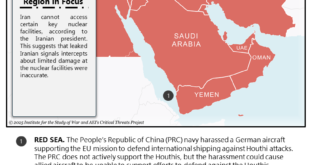Latest Developments
The Iran-backed Houthi terrorist group issued a warning on December 20 threatening to retaliate against U.S. warships if the American military were to target the Yemen-based group. This threat came on the heels of an announcement that the United States will lead a multinational mission to secure safe passage for commercial vessels sailing in the Red Sea, where the Houthis have repeatedly attacked ships in recent weeks. While the Houthis hope these attacks will harm Israel as it fights Palestinian terrorists in the Gaza Strip, threatening commercial shipping in the region stands to harm the Egyptian and Jordanian economies more than Israel’s.
Expert Analysis
“Despite being full peace partners with Israel and enjoying ample security benefits from the relationship, Jordan and Egypt have been unsparing in their condemnation of Israel in its war with Hamas. Perhaps the widening of the conflict to the Red Sea, and their core economic interests, will prompt them to reconsider.” — Mark Dubowitz, FDD CEO
“The Iranian-backed Houthis are destabilizing the Middle East with their escalating attacks on commercial shipping. The attacks have global ramifications because they risk enabling aggressive countries and terrorist groups to threaten global commerce with impunity. This is particularly true in the Red Sea, where their attacks harm the economies of Egypt and Jordan. The attacks must be deterred.” — Seth J. Frantzman, FDD Adjunct Fellow
Shipping Companies Pause Red Sea Routes
After weeks of mostly unsuccessful missile and drone launches against Eilat and closer-range attacks on ships with putative Israeli ownership, Yemen’s Houthi terrorist group announced on December 10 that it will consider any vessels bound for Israel to be legitimate targets. As a precaution, several major shipping companies have put their Red Sea routes on pause or rerouted them around Africa to Mediterranean destinations.
The escalating Houthi threat, billed by the Houthis as solidarity with the Palestinian terrorists fighting Israel in Gaza, has prompted the formation of Operation Prosperity Guardian, a U.S.-led multinational Red Sea security initiative.
Egypt May Lose Millions Without Suez Transit
Although the Houthis intended for their attacks to damage Israel’s economy, Egypt and Jordan stand to suffer more. The Houthi attacks have caused an 85 percent drop-off in business for Eilat, Israel’s Red Sea port. But Eilat is far less economically important than Israel’s Mediterranean ports of Ashdod and Haifa. The executive chairman of Israel’s Ashdod port, Shaul Schneider, told the Globes Israel Business Conference on December 19 that his staff stands ready to handle any cargo ships rerouted away from Eilat. Also addressing the conference, Uzi Itzhaki, chairman of the Israel Port Company, said Israel has yet to experience any significant increase in the price of imports. He attributed this to the fact that most of its cargo shipments come from the West rather than from Asia and therefore do not require Red Sea routes.
However, Aqaba, the Jordanian port next door to Eilat, is the kingdom’s only coastal access point. Jordan has no alternative for seaborne imports and exports. Also vulnerable is Egypt, which stands to lose significant income if ships no longer transit the Suez Canal between the Red Sea and the Mediterranean. In June, the Suez posted a record $9.4 billion in earnings for the 2022-2023 fiscal year, making it one of Egypt’s leading foreign revenue sources. At the December 19 conference, Itzhaki said approximately 60 vessels have so far suspended their Suez transit, at a cost to Egypt that he put at $600,000 per ship.
 Eurasia Press & News
Eurasia Press & News



